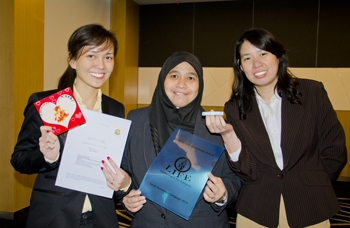Young Children’s Voices in Mathematical Problem Solving
Contributed by Dr Ho Siew Yin and Sng Wei Qin Abbie, from NTUC First Campus, for SingTeach Virtual […]
Read More
At Tanjong Katong Secondary School, teachers let student leaders run campaigns for social awareness to cultivate their spirit of altruism.
Altruism matters. Just ask the teachers at Tanjong Katong Secondary School (TKSS).
“We base the TKSS Student Leadership Framework around altruism,” says Mdm Halilah Binte Salim Alkhatib, Subject Head of Student Leadership and Talent Management. “We grow all our student leaders to become altruistic leaders.”
Halilah explains that student leaders should be proactive in placing the needs and interests of others before themselves, without expecting anything in return.
TKSS grooms them to become individuals who are competent, compassionate and constructive – values that are key to success in any field.

(From left) Ms Irene Chen, Mdm Halilah Binte Salim Alkhatib and Mdm Loo Ming Yang agree that a campaign is an authentic platform for students to develop altruism.
Can altruism be taught? As Ms Irene Chen, Level Head of Math, points out, “It’s not easy to develop altruism in a person unless an experiential learning platform is provided.”
So in 2008, the school experimented with an approach that gives student leaders an authentic platform to serve the school community. The student councillors were entrusted to run the school’s first student-led and student-initiated social awareness campaign against bullying. It proved to be a success.
”It’s a good platform for student-initiated efforts,” Halilah explains. “It allows our student leaders to serve and positively impact others without expecting anything in return.”
Moreover, the process of running a campaign covers all the guiding principles of the TKSS Student Leadership Framework, which aims to develop student leaders who contribute to a positive school culture and the community.
Since their first campaign in 2008, TKSS student councillors have continued to run week-long campaigns annually. These help to raise awareness of social talking points ranging from the need to demonstrate appreciation for others, to the challenges of parenting teenagers. Irene explains the key factors that helped their campaigns achieve school-wide success.
Firstly, the student leaders ensure that publicity that leads up to the campaign is expansive and executed well. This creates awareness about the campaign before the event, and continues to have an impact on the students even after it is over. Some examples of publicity materials are banners, posters, collaterals and air time during morning assembly for student leaders to introduce the campaign.
Secondly, during the week of the campaign, Character and Citizenship Education (CCE) lessons are facilitated by student councillors. They also plan and deliver the content for the assembly period of that week.
Irene explains, “The teachers are not only looking at the suitability and relevancy of the content, but we also ensure the modes of delivery are appropriate for the various levels and classes.”
Finally, a show of commitment by the student population is crucial. Hence, the organizing committee would request for a designated area in the school canteen where they can execute school-wide pledges and students can show their support. “If we can get the student population to commit to make a positive change, we know that the campaign is successful,” says Irene.
It’s not easy to develop altruism in a person unless an experiential learning platform is provided.
– Ms Irene Chan, Tanjong Katong Secondary School
Even though the campaigns are student-initiated and student-led, teachers still play a part. They ask guiding questions to sharpen student leaders’ thinking when they are conceptualizing the campaign. They also coach and provide suggestions, while observing student leaders as they rehearse activities that they plan to deliver. This ensures the quality of their learning experience.
Mdm Loo Ming Yang, one of the teachers in charge of the student councillors, explains: “As teachers, we need to ensure the quality of the campaign because we have to make sure that the information is accurate and unbiased. We approve and validate the proposal and materials prepared by organizing committee, and critique their rehearsals.”
The teachers also help with administrative matters, such as including the campaign and in the school’s calendar of events, and ensuring that student leaders have the opportunity to lead CCE lessons and assembly period during the campaign week.
While planning and running a campaign sounds challenging and time-consuming, the TKSS teachers believe it is all worthwhile.
By letting the students experience first-hand what it is like to work for altruistic causes, it is more likely that they will embrace the value of altruism. And if they can continue to work in the same spirit, these students will truly grow to become compassionate, constructive and competent leaders.